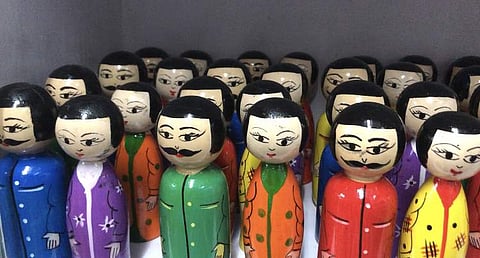

In Karnataka’s Channapatna village, toys used to come to life. For years, the region was popular for some of the best toymakers in the country, but today, only 15 families continue to practise the craft. “This shouldn’t come as a surprise considering the dismal fact that 80 per cent of the toys sold in the country are made in China. This is an alarming statistic because this is a country with a very rich toy-making tradition,” says Pete Jaison, who set up the website Vocal For Local Toys in the beginning of September to create a much-needed platform for these toymakers.
Born and brought up in Kochi, Pete is a graduate of St Xavier’s College, Mumbai. Working for the FinTech company Razorpay for the past two years, he has familiarised himself with businesses spread across industries like real estate, EdTech, logistics and shipping. And once the lockdown hit, he discovered that companies who get their supplies from local sources were better equipped to deal with the circumstances than those dependent on international supplies. “I was listening to the PM’s Mann Ki Baat speech where he proclaimed the importance of thinking locally if we ever want to prop up our slowly dying economy,” says the 25-year-old, “So I started researching and reading more about local initiatives and why it’s important for me, as a consumer, to choose a local product over an international one, especially in times like these.”
Through the reasearch, Pete learnt that, from a global perspective, India commands only 0 to 5 per cent of the entire global toy industry. With all this information in mind, he understood that from the 1990s to 2010s, toymakers drastically reduced in the country. From thousands of families dedicated to the craft in villages across rural India, the numbers were slowly dwindling. In search for more answers, he drove out to Channapatna, a few hours from Bengaluru where he currently resides.
He says, “Even during the lockdown with reduced imports from China due to rising tensions, these people are unable to take advantage of the situation because of the lack of support for their craft. After speaking to a few people, I decided to set up the website.” Set up with the help of a few close friends, vocalforlocaltoys.com
Pete works closely with the toymakers to come up with new designs of toys. The plan is to work on newer kinds of toys that are suitable for the current generation. He says, “The first thing that comes to a person’s mind when they think of toys is probably remote-controlled cars and stuff like that. These toys are extremely traditional, like wooden dolls. They are all handmade and coloured using vegetable dyes. And since they have been making them for hundreds of years, no chemicals are used at any point of this process. So they offer the best possible alternative.”
